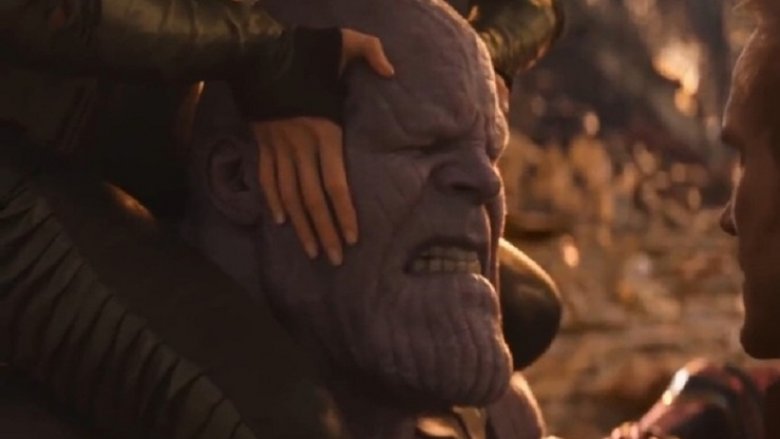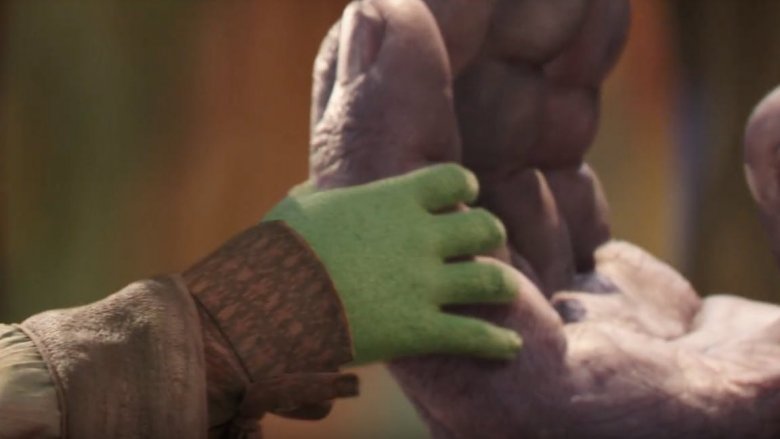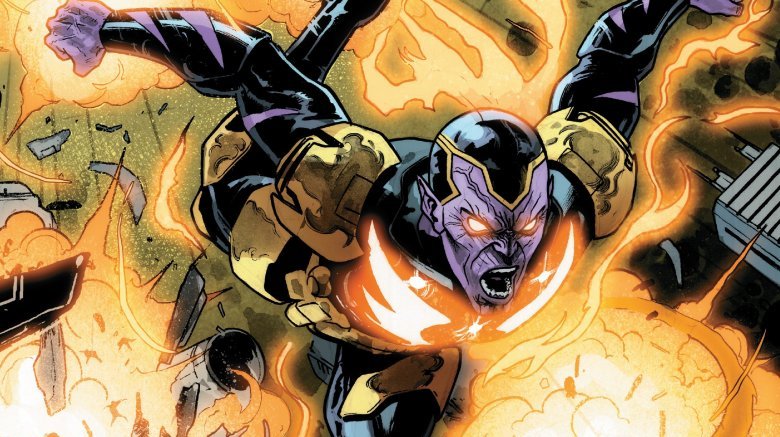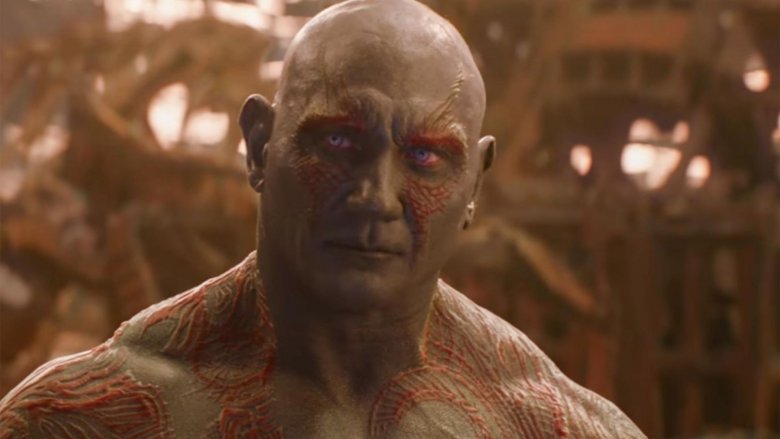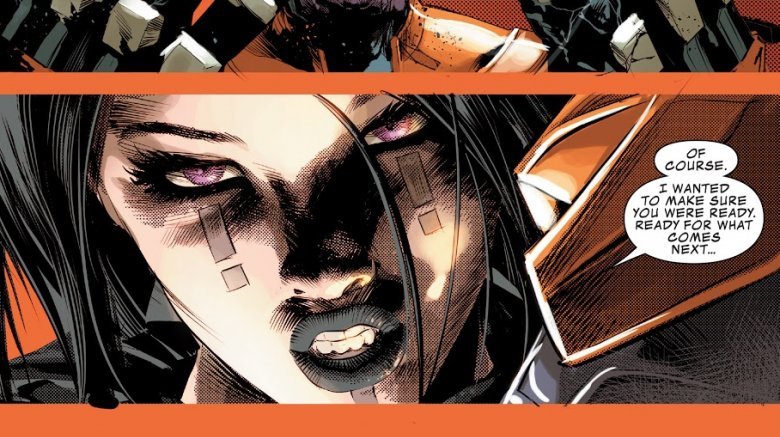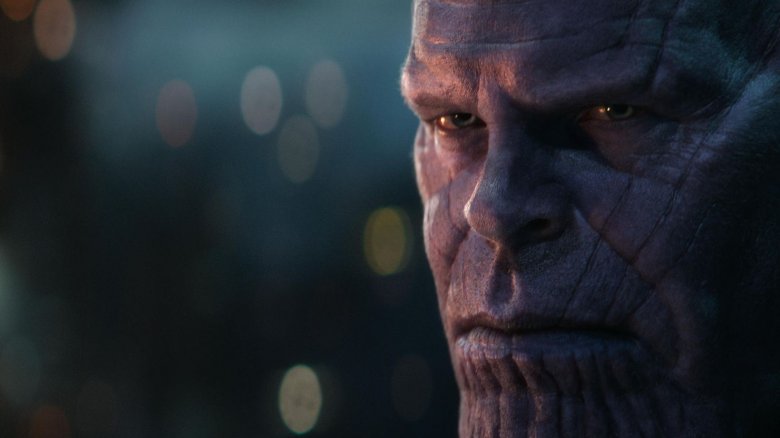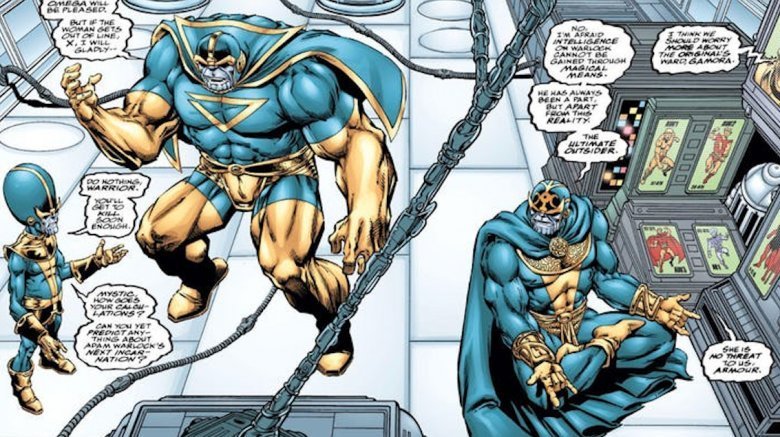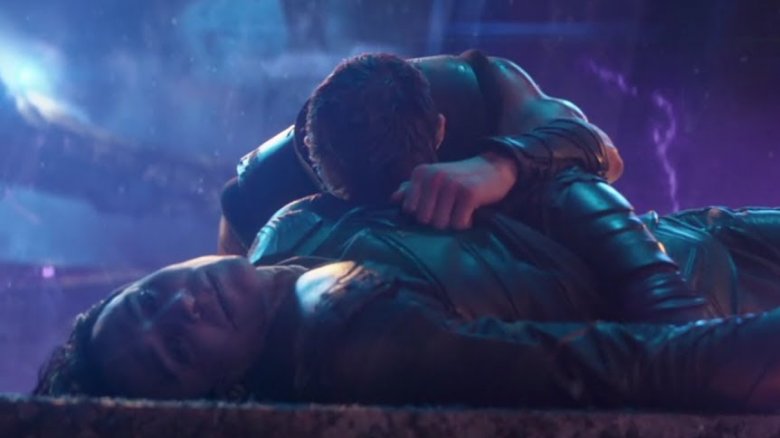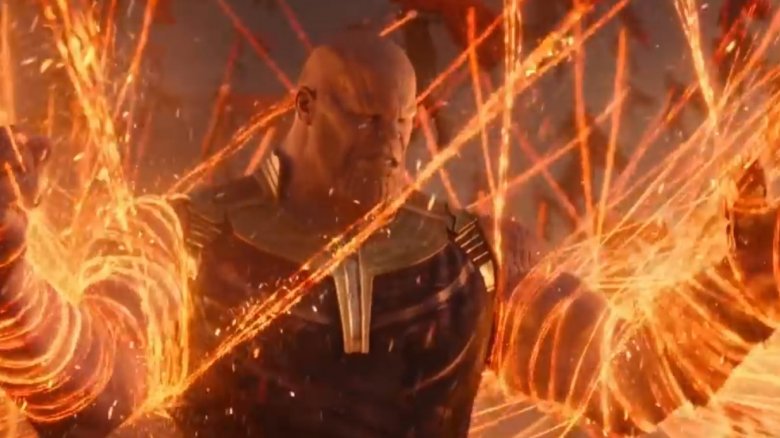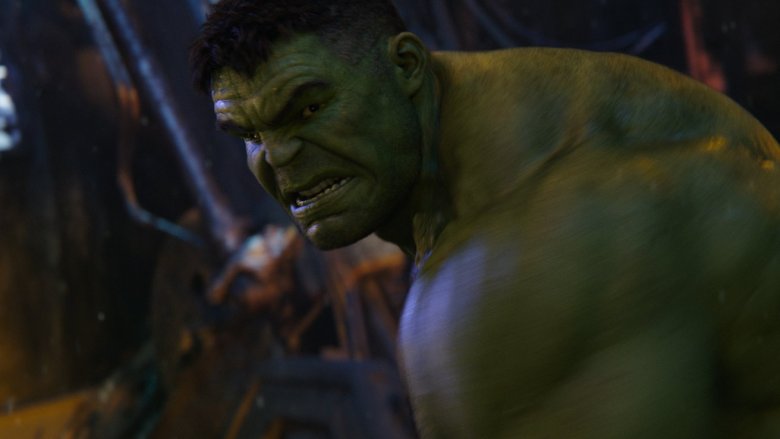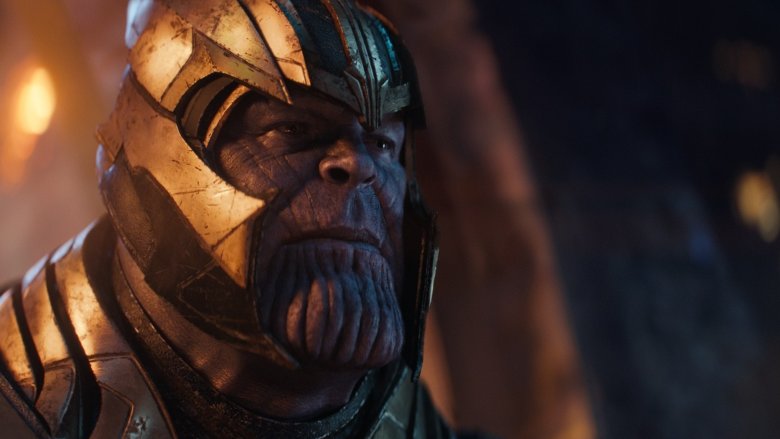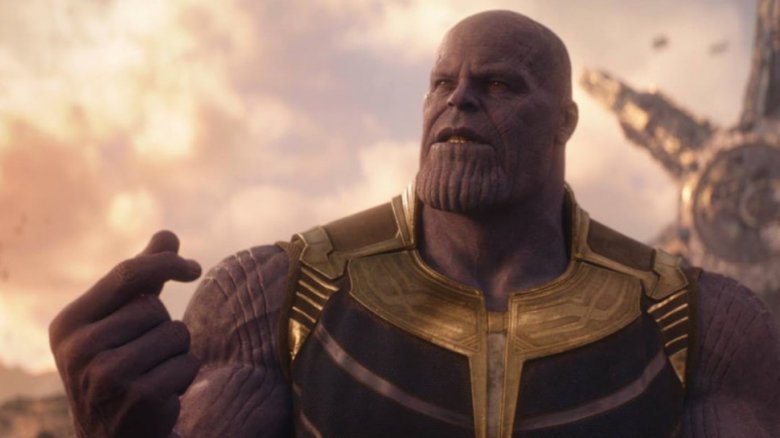Weaknesses You Didn't Realize Thanos Had
After seeing 2018's Avengers: Infinity War, no one could blame you if you can't imagine a possible scenario that sees the good guys trouncing Thanos. Whether it's on the big screen or in the comics, Thanos consistently proves to be one of the fiercest foes in the Marvel pantheon. He's killed and crippled superheroes, he's singlehandedly brought entire civilizations under his merciless rule, and oh yeah — he's also wiped out half the life in the universe.
But no one's invincible; not even the Mad Titan. As thoroughly as Thanos defeated the Avengers and the Guardians of the Galaxy in Infinity War, he didn't walk away unscathed, did he? As plenty of angry fans pointed out, things could've ended a little differently if Star-Lord had kept his cool on Titan. Even Thanos himself all but admitted that if Thor had "gone for the head," the cataclysmic purge never would've happened.
Thanos may be Marvel's most challenging villain to defeat, but he's not unbeatable. All you need for proof is what we've seen in the films, along with decades of his appearances in Marvel's comics. We looked through everything we could to find weaknesses you didn't realize Thanos had.
Family matters
One of the most emotionally powerful moments in Avengers: Infinity War is the death of Gamora. It's the only death in the film Thanos seems to feel any regret for. Later, after the fateful snap, Thanos is visited by a vision of Gamora as a child asking him what wielding the gauntlet cost; he answers "Everything," and what we've seen tells us he isn't exaggerating.
Thanos' work demands cold, calculating violence that doesn't make any kind of special exceptions for family. The fact that the vision of the child Gamora confronted Thanos immediately after his genocidal snap is telling. As content as he may want to be watching the sunset at the end of Infinity War, it seems likely the murder of Gamora — perhaps the only being Thanos truly loved — is going to eat away at the Mad Titan and it may be what turns the tide for the Avengers.
Thanos' weakness for family is evident in the comics as well. He hardly tried to defend himself when Gamora beheaded him in 2018's Infinity Wars Prime #1. While he did ultimately murder his father Mentor in a fit of rage in 2017's Thanos #2, he waited decades to do it, in spite of his father opposing him and his plans multiple times. Likewise Thanos' brother Starfox and potential granddaughter Nebula are still alive, regardless of how many chances the Titan has had to murder them and how many reasons he's had to do it.
The unwanted son
In Marvel Comics' 2013 miniseries Thanos Rising, the Mad Titan wandered aimlessly through the galaxy taking up with alien women on different planets, fathering children, and ultimately leaving each new family to start the process over again. Eventually, at the behest of Mistress Death, Thanos returned to each abandoned family and murdered both mate and child — but apparently he missed one. Marvel's 2013 line-wide event Infinity opened with the Mad Titan searching the cosmos for the boy who turned out to be Thane — the son of Thanos and an Inhuman woman.
Thane proved to be the key to Thanos' downfall in Infinity. Later, in Thanos' solo series, his son was manipulated masterfully by Mistress Death. At first it seemed Thanos' former lover was gunning for him and using Thane to do it. She aided Thane in locating and imbuing himself with the infamous Phoenix Force, with which he almost killed his powerful father. In the end, Mistress Death revealed she never wanted to kill Thanos, but instead used Thane as a powerful pawn to test Thanos.
Thane has yet to show up — if he ever will — in the MCU. But in the comics, he remains a threat to his power-mad father.
Hate
Perhaps no one in Marvel's cosmos — either on the screen or in the comics — inspires hatred more thoroughly than Thanos.
Drax the Destroyer is the perfect example. While in the movies Drax wants vengeance on Thanos for the death of his family, in the comics Drax was created just to kill Thanos. Kronos — the cosmic god who is also Thanos' grandfather — created Drax with the sole purpose of killing Thanos. Drax's passion for Thanos' death was so complete that in early appearances he could be more of a hindrance to other heroes than a help. Rather than stop to strategize with allies, Drax just threw himself at Thanos regardless of the situation. When he was resurrected, along with Thanos, in 1990 issues of Silver Surfer, Drax attacked everyone he saw, yelling "Where's Thanos?" over and over, seemingly not caring if he was attacking friend or foe.
Imagine that someone exists only to kill you. Not that they just really, really hate you, but that they literally would not exist in the universe except for the fact that someone else created that person just to kill you. If that's the kind of hatred Thanos inspires, he can be as strong as he wants and he can get as many glowy rocks on his glove as he wants. Sooner or later, someone is going to kill him.
Death
One of the biggest victims of Thanos' journey from comic book to movie screen was the being over whom he obsessed endlessly: Mistress Death. In the game-changing 1991 miniseries Infinity Gauntlet – from which Avengers: Infinity War took much of its inspiration — Mistress Death was the reason Thanos wanted to kill half the universe in the first place. He didn't want to bring balance; he wanted to give the woman he was "courting" a gift.
In Marvel Comics, Death itself takes the form of a woman. In the past she had appeared hooded, wearing dark robes, and usually having a bare skull as a head. But in 21st century comic book appearances like those in Thanos, Thanos Rising, and Cosmic Ghost Rider, Marvel replaced the skull and bones with a more sci-fi/goth look.
No one in the cosmos can manipulate Thanos like Mistress Death. While in Infinity Gauntlet Death remained silent and stoic in the face of Thanos' propositioning, more recent series revealed her to be a master puppeteer. In the origin miniseries Thanos Rising, the younger Thanos has no idea who the pretty young girl following him around is, but eventually he realizes he will do absolutely anything for her. It's Mistress Death who orders Thanos to wage war and murder even his own children. As much as Thanos has evolved over the years, the fact that he would do whatever Mistress Death asked has never changed.
Overconfidence
You could argue a word like "overconfidence" doesn't apply to a guy like Thanos. If you manage to beat the tar out of Earth's mightiest heroes and murder half the universe with the snap of your fingers, what could you be overconfident about?
But if you think about how Thanos handles the heroes in Avengers: Infinity War, his overconfidence becomes clear. In Knowhere when the Guardians first confront him, on Titan, and at the end when he comes to Wakanda for the final stone, Thanos has the power to utterly destroy the heroes who get in his way. Not just hurt them, but to absolutely obliterate them. Why doesn't he turn Star-Lord into a quivering pile of jelly like he does with Drax and Mantis? Why does he allow Drax and Mantis to transform back? Why does he bother using his fists at all when fighting heroes like Black Panther and Captain America in Wakanda? For that matter, why didn't he wring Thor's neck just like he did his brother's in the first few minutes of the movie?
Because in his mind, he doesn't have to. While he may see some of the Avengers as viable threats, it never crosses his mind they might actually beat him. And that's going to be his downfall in Avengers: Endgame. After all, if he'd wanted to, he could've made sure every last Avenger and Guardian was included in his purge. By the end, he's probably going to wish he did.
Curiosity doesn't kill JUST cats
In the comics, Thanos' search for power didn't begin or end with the Infinity Stones. Thanos has explored multiple avenues to absolute conquest, including using his scientific genius to create things he sometimes wished he hadn't.
For example, there are the Thanosi. In the 2002 miniseries Infinity Abyss, fans learned that at some point in the not-too-distant past Thanos had experimented with mixing his abilities with those of different powerful Marvel characters. He created clones of himself that were based on fusions between himself and characters like Doctor Strange, Professor X, and even Galactus. Once he tired of his experiments, he abandoned the clones — and the clones didn't take too kindly to that.
Calling themselves the Thanosi, the clones tried to kill Thanos and end the universe itself. Thanos was able to stop his vengeful clones with the help of a band of heroes including Spider-Man, Adam Warlock, Gamora, and Doctor Strange. The conflict served as a reminder that just because you can do something, it doesn't mean you should — though that doesn't seem like a lesson that will stick with a guy like Thanos.
Cruelty
Thanos sells himself as a cold, calculating being who is cruel to be kind. Yes he kills, but according to Thanos, he does it all for the good of the universe. But if you agree that actions speak louder than words, then Thanos' actions in Avengers: Infinity War prove that all his words about a "grateful universe" are self-serving noise.
Thanos' brutal murder of Loki is one of the most telling moments of Infinity War in terms of the question of Thanos' motives. Thanos enjoys killing Loki slowly. Once Loki is dead, Thanos looks... well, frankly, he looks like he needs a cigarette. He makes a point to drop Loki's corpse right in front of Thor. If you believe Thanos kills to restore a universal balance, we've got some bridge property we can offer at a low price in the Brooklyn area. Thanos kills because he's a madman who loves killing.
So how does that cruelty translate into weakness? Well, from a purely pragmatic point of view, his sadism — along with his overconfidence — stops him from eliminating potential threats. Why doesn't he just obliterate the various Avengers and Guardians with the power of the Stones? Because he gets more enjoyment out of feeling their bones crunch. He could turn them all into bubbles just like he did to Gamora's blade and he'd never worry about any of them again. But then he'd never get to make them bleed, and that wouldn't be satisfying enough for the Mad Titan.
Magic
Usually if the good guys seemed to stand any kind of chance against Thanos in Avengers: Infinity War, it was a group effort. Of all the heroes to face Thanos one on one, no one gave the Mad Titan more trouble than Doctor Strange. When the two squared off on Titan, Strange actually looked like he might take Thanos out a time or two. In spite of Thanos being in command of four of the six Infinity Stones at that point, Strange gave him a real fight.
That's probably because magic is the one area in which Thanos is lacking. He knows combat strategy, psychological manipulation, and he can science-bro with the best of them, but magic is Thanos' blind spot. That's why when Strange ultimately surrenders the Time Stone to Thanos, the Titan fears treachery. Even as the Stone is in his hand, he gives Strange a sideways glance that betrays his reluctance. Strange's mystic abilities are a mystery to Thanos, and he knows that means his bargain with Strange is potentially more dangerous than any brawl.
Thanos' admiration for Strange shows in the comics as well. When it's served his purposes, the comic book Thanos has allied himself with his more heroic counterparts. Often — including the miniseries Infinity Abyss and Marvel Universe: The End — he chooses Doctor Strange as one of those allies. The fact that he chose Strange as partial framework for his Thanosi clones is further proof of his respect for the Sorcerer Supreme.
Hulk
It may seem strange — considering the beating Thanos gave Hulk in Infinity War – to count the green goliath among Thanos' weaknesses, but the Titan himself might disagree. At least, the Thanos of the comics might.
The 1990 miniseries Thanos Quest chronicled the Titan's gathering of the Infinity Stones, and it was Thanos' acquisition of the Power Stone in Thanos Quest #1 that revealed his fear of the Hulk. To get the Stone, Thanos battled the cosmic powerhouse Champion. Thanos noted during the fight that the angrier Champion got, the stronger he got, and that it was probably similar to what he would experience if he ever fought the Hulk — as he put it, "a conflict I've sought to avoid for years."
It's telling that the Hulk was on Thanos' radar considering the two hadn't met at that point, and that the Hulk wasn't the kind of space-bound hero Thanos would have occasion to run into. Even now, decades after the publication of Thanos Quest #1, comic book readers have never truly seen a Thanos/Hulk clash in which Thanos didn't have the Infinity Stones to protect him. There was a 2014 Thanos vs. Hulk miniseries that somehow didn't actually feature a prolonged physical battle between the two, and the Titan had the Black Order to put between himself and Hulk when they clashed in 2013's Infinity. It seems like Thanos is still seeking to avoid conflict with the green guy even after all these years.
Himself
By the time Thanos returned to Marvel's comics for Infinity Gauntlet he had been absent from the panels for over a decade, having died in 1977's Marvel Two-In-One Annual #2. When he returned, the surviving heroes (Infinity Gauntlet began with Thanos' genocidal purge rather than ending with it) searched their records of past confrontations with Thanos for ways to defeat him. In Infinity Gauntlet #3, the android Vision told readers the good news and the bad news. The good news was that Thanos was beatable. The bad news was that Thanos had to be trusted to defeat himself. Whether he did it, as Vision put it, "consciously or subconsciously," it was always Thanos who provided the means of his own defeat. Thanos, Vision theorized, didn't truly want to win, and that would always be the key to his downfall.
The stories support Vision's theory. Whether it was the Cosmic Cube or the Infinity Stones, Thanos' stated goal was almost always to capture some cosmic artifact that would grant him absolute power. The thing is, he usually got it. He usually succeeded in ascending to utter omnipotence and still he would ultimately lose. How does a being who knows everything and can do anything lose? The only possible reason, as Vision surmised, was if that being never truly wanted to win.
Know thyself, Grimace
Most of Thanos' weaknesses aren't what you expect from a comic book character. There's no rock from a specific planet that weakens him or a particular color that negates his abilities. Thanos is his own worst enemy. It may seem cliche, but that doesn't make it less true. His hubris, his sadism, and his penchant for self-defeat are bigger barriers to Thanos than any Avenger.
What makes those weaknesses so dangerous to Thanos is that he refuses to acknowledge them. The Thanos of Avengers: Infinity War does not know himself. He sees himself as a pragmatist savior, the thankless harbinger of a cold but undeniable truth that will save the universe through ruthlessness. The reality is much simpler — Thanos is powerful, with a genius intellect, and he loves killing. If he truly believes in his stated goal of balancing the universe, it's a crusade he created to both justify and facilitate his bloodlust. Thanos can't face this truth, so he can't see the opportunities he creates for his enemies. More likely than not, it will ultimately be Thanos who hammers the nails into his own coffin before the end credits roll on Avengers: Endgame.
